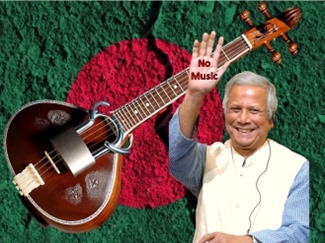BANGLADESHI IDENTITY UNDER FIRE:
MUSIC, EDUCATION, AND THE TUG-OF-WAR WITH RELIGION
BANGLADESHI
IDENTITY UNDER FIRE: MUSIC, EDUCATION, AND
THE TUG-OF-WAR WITH RELIGION
In Bangladesh, a fierce national debate has flared into the streets and classrooms as a government decision to cancel plans to hire music and physical education teachers in primary schools has provoked a broader confrontation about culture, identity and the country’s secular tradition. Protests from Dhaka to Chittagong have framed this issue not merely as an administrative measure but as a clash over what it means to be Bangladeshi in the 21st century. At the heart of the discourse lies a question that carries geopolitical undertones: Is the move by the Yunus government a response to external pressures, including Pakistan’s influence or is it an internal prioritization of religious sentiment over cultural education? The topic resonates beyond borders because it touches on the delicate balance between faith, culture and modern nationhood in a region with a long, complex history.

Historical context and the cultural stakes
Bangladesh was born out of the Bengali-speaking heartland, steeped in a culture of music, literature and creative expression that has long defined its public life. Many observers have lauded the nation’s secular constitution and its tradition of cultural plurality as essential to its democratic aspirations. Yet, the rise of religious conservatism in various forms has created tensions within state policy and civil society. When policymakers announce changes that affect schools, places where the next generation forms its worldview, the stakes escalate quickly. Music in schools has often been considered a vehicle for universal human expression and social cohesion; removing or restricting such subjects can be read as a signal about the boundaries of permissible culture in the public sphere.
Muhammad Yunus and a contested narrative
Muhammad Yunus remains a controversial figure in Bangladesh’s political landscape, with international acclaim for microfinance contrasting sharply with domestic skepticism about his leadership. Detractors argue that his approach prioritizes political calculus over safeguarding cultural education, hinting at concessions to hardline religious factions that threaten secular and pluralistic traditions. They contend that his administration’s emphasis on administrative and financial feasibility over music and physical education in schools signals a surrender to religious pressure rather than a principled defense of cultural education. Opponents question whether his policies reflect a deliberate compromise with conservative forces, thereby weakening secular commitments and democratic norms. The central question remains: Is the Yunus-led government genuinely pursuing pragmatic governance, or is it merely bowing to external and internal pressures that threaten Bangladesh’s cultural and educational pluralism?
Culture as national identity and the secular framework
A central argument in the protests is that culture and religion are not mutually exclusive and that education in the arts and physical culture cultivates national pride, resilience and critical thinking. Critics of the policy argue that reducing or reconfiguring these subjects undermines Bangladesh’s secular heritage, which they see as essential to sustaining a pluralistic society. Proponents of a more religion-inflected public sphere may contend that religious education should be strengthened or that religious sensibilities should be given greater space in public institutions. The tension between these visions reflects a wider contest about what kind of national identity Bangladesh seeks to cultivate: one rooted in secular, inclusive pluralism or one more closely aligned with conservative religious values.
Voice, dissent and the power of symbolic acts
Across campuses, students and faculty have invoked national symbols and the memory of historical struggles to press their case. The display of national anthems, liberation songs and theatre performances in public demonstrations functions as a powerful form of symbolic resistance. The refrain culture does not oppose religion - resonates with many who fear a slippery slope toward erasing cultural diversity in the name of faith. These protests are not merely about curriculum contents; they are about who gets to define culture, who controls public space and how a nation remembers its past while navigating its present.
Conclusion: A crossroad for Bangladesh
The protests against the cancellation of music and physical education posts have crystallized a broader debate about the direction of Bangladesh’s national identity. Whether the policy is primarily an economic necessity, a reflection of political compromise or a response to internal or external pressure remains to be seen. What is clear is that culture - music, theatre, sport and education in the arts - is not a luxury; it is an essential component of a living democracy. The question Bangladesh now faces is whether it will protect its secular, culturally rich heritage while navigating the competing demands of faith, politics and global scrutiny. If a nation loses sight of its cultural soul, it risks not only a drift from its historical roots but a weakening of the very resilience that sustains its future.
References:


